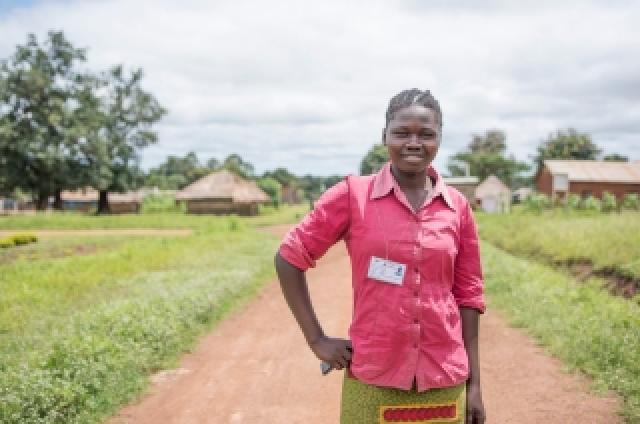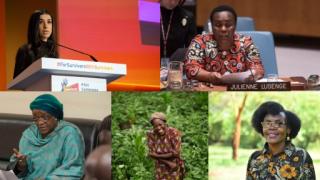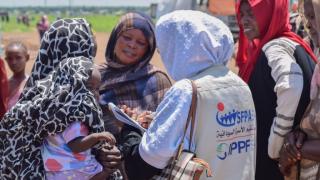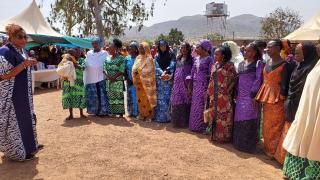Creating a safe space to heal after I was abducted twice in South Sudan
Creating a safe space to heal after I was abducted twice in South Sudan
My name is Florence Wuya Dumba, and I am a social empowerment trainer at Women for Women International in South Sudan.
For over three years, I have been working closely with participants of our Stronger Women Stronger Nations programme, supporting them to realise their power and creating safe spaces where they can share their experiences and heal from their trauma.
As a survivor of two abductions, I can attest to the increase in violence against women and the urgent need for support. The first incident occurred in 2018 when I was travelling to Uganda to visit my family.
We had just started our journey from Yei town when we were ambushed and forced off the road into the bushes. There were seven of us in the vehicle. The assailants ordered us to exit the car. They ransacked us and took everything, including our valuables and all the money we had. I was terrified and thought I might be killed.
Afterwards, we were taken into the bush and walked for nine days. We barely had anything to eat or drink. We survived on yams. Tragically, one of the women in our group died. The abductors were getting tired and, eventually, ended up sending us to a local chief who connected us with an INGO that rescued us.
The impact of this traumatic experience is something I carry with me every day.
But little did I know then that I would have to face another horrifying experience a few years later.
This incident occurred in November 2024 while I was travelling to Uganda, and it was equally frightening and traumatic. We were confronted by armed individuals who forced us out of our vehicle. They commanded our driver to take us into the bush, and we had no choice but to follow. Once we reached the bush, they demanded that we surrender all our belongings. We were asked to carry all our luggage as we walked deeper into the bush.
They took everything we had, set our vehicle ablaze, and then released us, leaving us to find our way out.
The first few days were incredibly difficult to endure because the abductors were strangers, and I feared they might kill us at any moment. Despite my fear, I complied with the abductors' instructions. Whenever we stopped, I would try to fall asleep, and sometimes I would sing to feel better.
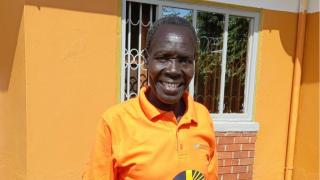
After my release, my friends, colleagues and the women I had been training were the first to support me.
The programme participants were among the first individuals I met after returning from the bush. I felt compelled to share my abduction experiences because I believe it could happen to anyone in my community. I also returned to work immediately; staying home would have led me to dwell on the incident and everything I had lost.
Training the participants and sharing my experiences proved to be therapeutic for me, as some of them had gone through similar situations. Through the training sessions, I began my healing journey. A colleague also introduced me to a counsellor whom I still speak with on a weekly basis about my experiences.
I strongly believe that expressing our vulnerabilities by sharing our stories is a powerful tool for healing and understanding.
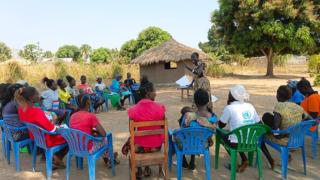
Every day after my social empowerment class with our participants, we hold a voluntary thirty-minute session where we sit down and share our experiences. This session serves as a safe healing space, and everything discussed remains confidential and personal. The issues that are shared often involve abductions, marriage issues, household finances and gender-based violence. Sharing these experiences is a healing process.
Over the years, the women have become comfortable and now speak up about various challenges they face. Since we started these discussions, I have not encountered any issues regarding confidentiality, which demonstrates the trust we are building.
If we find someone who is struggling and we cannot provide the necessary support as a group, we refer them to professional counsellors for additional help. Trust and support are crucial in these situations, and it's important for the women to remember that they're not alone.
I advise the women I train to remain calm in difficult situations. In a dangerous situation, I feel it is often safer to stay submissive and follow instructions. If faced with questions you can’t answer, silence may be the best option, as giving wrong answers can complicate matters. Compliance can feel uncomfortable, but it can be the safest approach.
The situation has become increasingly dangerous in South Sudan, and one never knows when abductions might happen. Some people have gone through such situations many times, and I myself have experienced it twice. I now understand that it can happen to anyone, and that is why I support other women in my community.
It is crucial that we address these issues and work towards providing a safe space for women and the tools they need to cope with the trauma that follows such harrowing incidents.
Read more
In honour of the International Day for the Elimination of Sexual Violence in Conflict, we spotlight five extraordinary women leading the fight against this devastating form of violence. From Nobel laureates to grassroots activists, these changemakers are demanding justice, breaking silence and creating hope for survivors around the world.
Read about how Dr. Asma Elnaeem and Dr. Hiba Ahmed are providing vital healthcare and support to women in Sudan amidst the ongoing conflict, showing incredible resilience despite immense challenges.
Bukola Onyishi, our Country Director in Nigeria, shares how gratuates of our year-long programme have taken the initiative to pass along their learnings to 475 women from diverse religious and ethnic backgrounds. Bukola says "Their commitment to sharing knowledge and fostering resilience has been nothing short of inspiring to me."
Each week, these trainers—graduates from our programme—brought the women together to teach them social and economic skills using participant handbooks, ensuring that the lessons they once received from Women for Women International continue to reach more women.

